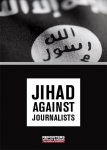A year after the Charlie Hebdo tragedy in which eight journalists were killed, Reporters Without Borders (RSF) is publishing Jihad against journalists, a report about the war that Islamist armed groups such as Islamic State (Daesh), Al-Qaeda, Al-Shabaab and Boko Haram wage against media personnel.
The report examines the origins of their hatred for journalists, the totalitarian ideologies and systems that insist that journalists either submit or die, the propaganda machines of their extremist and violent version of Islam, and their strategy for conquering minds by eradicating independently reported news and information.
The report begins with the blacklist of 11 journalist, cartoonists and intellectuals that Al-Qaeda’s “magazine” Inspire published in the spring of 2013. Alongside Ayaan Hirsi Ali and Salman Rushdie, it included Stéphane Charbonnier, the cartoonist also known as Charb, who was Charlie Hebdo’s publisher and who was one of the attack’s victims. Issue No. 14 of Inspire in the summer of 2015 described the massacre as the “9/11 of France” and warned Charlie Hebdo, “If you return, we too shall return.”
“Jihadism now ranks alongside the most terrible dictators among the world’s worst predators of press freedom,” Reporters Without Borders secretary-general Christophe Deloire said.
“As the Charlie Hebdo massacre showed, we are entering a period in which this threat is becoming globalized. It will not be possible to protect journalists – and by extension all of the world’s peoples as well – unless there is an all-out effort to oppose ideologies of hate that often have state support. Preserving media freedom and independence is clearly a major challenge for the future of humankind.”
RSF reveals the “11 commandments” for journalists that Islamic State decreed in the Syrian province of Deir Ezzor in October 2014. The first is to swear allegiance to the caliph. Another forbids journalists to work for TV channels “that are fighting Islamic countries.” Journalists cannot publish any article without first consulting the IS “media office.” In the event of any breach of the regulations, “the journalist will be held responsible.”
Journalists who cover Islamic State’s activities objectively are regarded as “enemy soldiers” and as “targets to be taken out.” Some specialists see IS policy towards the media as the implementation of the ideas in a 2007 Jihadi pamphlet called The Management of Savagery. Attributed to one Abu Bakr Naji and regarded as an Islamist Mein Kampf, it is full of references to the media, but always in the context of an “information war.”
IS media policy has two strands. One is propaganda, which includes sophisticated videos with tracking shots produced by “media brigades” with professional cameramen who are paid up to seven times as much as the foot soldiers and are sometimes even assigned work cars. The other consists of arrests, kidnappings, summary executions and murders.
Its victims include the Iraqi photo-journalist Jala’a Adnan Al-Abadi. He fled the IS-controlled city of Raqqa but, although he had no money, he decided to go back because he thought he had a duty to cover the way IS treats the civilian population, which includes crucifixions, beheadings and torture. He was arrested shortly after his return and was taken to a detention centre where it seems he was immediately executed. Naji Jerf, a documentary film-maker who was being helped by RSF, met a similar fate. He was murdered in Gaziantep, in southern Turkey, on 27 December, as he was about to travel to France with his family.
Meanwhile, journalists who are just doing their job sometimes find themselves being accused by governments of spreading extremist propaganda. Complicity with terrorists, defending their actions or even spying for them are among the charges brought against journalists in Syria, Somalia, Egypt and Mali on the grounds of combatting terrorism.
This was the case with Simon Ateba, a Cameroonian journalist who was accused of spying for Boko Haram because he went to the Minawao camp for Nigerian refugees in the north of the country to cover the living conditions there. It is also the case with Can Dündar, the editor of the Turkish newspaper Cumhuriyet, who has been detained since November for publishing evidence of Turkish arm deliveries to northern Syria.
rsf.org



